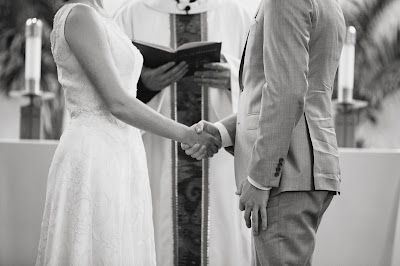How to reflect on your marriage (and still stay married)
 |
| The first "I do." July 23, 2016. Photo by Kelly Prizel Photography |
Julia: I was never a firm believer in the folk wisdom that “opposites attract.” But then I married M, and then we sat down to prepare this talk.
M: When we saw our notes for this presentation, we thought, “Are we really so night and day?” Our differences suddenly seemed more drastic than they feel on a day-to-day basis.
Julia: Which then made us wonder … After three years of marriage, are we growing in different directions? Are we doubling down on our natural tendencies? And how on earth are we making it through our daily lives intact?
Being married has been one of the greatest joys and greatest lessons of my life. At times I feel I live on the learning curve with nary a plateau in sight. But once in a while, an opportunity arises to hit "pause" on learning and press "play" on reflection -- which Nature Boy and I get to do as part of the team for our church's marriage preparation program.
In its unabashedly loving and welcoming way, my parish does Pre-Cana (the Catholic Church's colloquial term for its marriage prep programs) a little differently. Besides our pastor's brief opening remarks at the start of the day-and-a-half event, the program is led entirely by married couples of different ages, stages, and backgrounds. The intent is to give the participating engaged couples an opportunity to focus on what they want out of their new, shared life; quiet time and space to reflect on big questions away from wedding planning stress; and insight into discoveries and approaches that have helped other married couples fully live out their sacramental vows. It's inspiring, thought-provoking, encouraging, sobering, and emotional -- much like marriage itself.
For the most recent session, Nature Boy and I were called upon to present our first talk. The topic: "Daily Living." Just as you're not advised to perform surgery on yourself, sitting down as a couple to dissect your day-to-day rhythms did not immediately seem wise. My husband was tense. I was overbearing. We were writing in a shared Google doc, and it took every ounce of my willpower and knowledge of the creative process to let him put down a rough first draft in the faith that we'd revise later.
Basically, our process to create this talk mirrored the point of the talk, which was how our personalities and habits permeate and shape our domestic life. We ended up covering such topics as energy (introvert/extrovert), environment (natural/urban), diurnal rhythms (night owl/early bird), levels of tidiness (eh/yes please), approaches to conflict (we both avoid it), desire for control (pretty much all me), and so on. We ended on a story that regular IMS readers might recognize (an adapted version of "The lesson of the table") and closed with an alternating recitation building off the phrase, "This is the person who...".
That's when I lost it.
I was doing SO WELL during our actual talk, hitting laugh lines, patting Nature Boy's back affectionately, pausing after important takeaways. But then I got to the last line I'd drafted, and when I said it out loud in front of a roomful of relative strangers, every moment of joy, every shared sorrow, every disagreement, every wordless hug, every act of service, every discovery welled up within me. Here was the enormity of lifelong commitment. Here was our vow, which we choose to affirm each day. Here was our marriage's raison d'être:
"This is the person who always reminds me that though the world can be harsh, it is also beautiful, and we get to experience it together."
It's not a flashy sentence or even a particularly eloquent one. But it is heartfelt and -- more importantly --true. Which is why my voice cracked and my tears leaked. Because partnership is not for the faint of heart; it is for the whole-hearted.
Prayer #343: How to Do "I Do"
Set "I do" on endless loop, because it's the soundtrack of a marriage.
You'll say "I do" to mistakes and misunderstandings. You'll say "I do" to celebrations and silence. You'll say "I do" to being wrong, being right, and being somewhere in the middle that neither of you finds comfortable but does admit is necessary.
Most of all, you'll say "I do" each night to an entirely new person who has been transformed by the catastrophes, triumphs, and lessons of their day. And this person will say "I do" to the new you too, each night, until the nights run out.
God who gifted us free will, help us say these words with hope (if not always with conviction). We may voice them with a whoop, a mutter, or a sigh, but we are voicing them nonetheless. Be with us in this commitment -- a practice built on loving choice.
Amen.